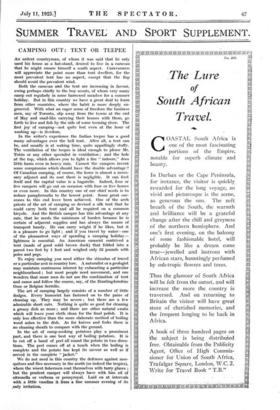CAMPING OUT : TENT OR TEEPEE
Aar ardent countryman, of whom it was said that he only used his house as a hat-stand, desired to live in a caravan that he might ensure himself a south aspect. Caravanners will appreciate the point more than tent dwellers, for the Most prevalent tent has no aspect, except that the flap should avoid the prevalent wind.
Both the caravan and the tent are increasing in favour, owing perhaps chiefly to the boy scouts, of whom very many camp out regularly in some harrowed meadow for a .summer holiday. But in this country we have a great deal to learn from other countries, where the habit is more deeply en- grooired. With what an eager sense of freedom the business men, say of Toronto, slip away from the towns at the end of May and snail-like carrying their houses with them, go forth to live and fish by the side of some teeming river. The first joy of camping—not quite lost even at the hour of washing up—is freedom.
In the writer's experience the Indian teepee has a good many advantages over the bell tent. After all, a tent can be, and usually is at waking time, quite appallingly stuffy.
The ventilation of the teepee is ideal enough to please Mr. Tobin or any other specialist in ventilation ; and the hole at the top, which allows you to light a fire " indoors," does little harm even in heavy rain. Cannot the campers invent some compromise which should have the double advantage ?
Of Canadian camping, of course, the horse is almost a neces- sary adjunct and its cost there is negligible. It can feed itself and the capital value is a bagatelle. Indeed, four or five campers will go out on occasion with four or five horses or even more. In this country one of our chief needs is to reduce paraphernalia to the lowest point. Some great suc- cesses to this end have been achieved. One of the arch priests of the art of camping so devised a silk tent that he could carry both tent and all he required on a common bicycle. And the British camper has this advantage at any rate, that he needs the minimum of burden because he is certain of adjacent supplies and has always the means of transport handy. He can carry weight if he likes, but it
is a pleasure to go light ; and if you travel by water—one of the pleasantest ways of spending a camping holiday—
lightness is essential. An American canoeist contrived a tent (made of good solid brown duck) that folded into a parcel two feet by 1 foot and weighed only 32 pounds with poles and pegs.
To enjoy camping you need either the stimulus of travel or a particular zest in country lore. A naturalist or a geologist
may maintain continuous interest by exhausting a particular neighbourhood ; but most people -need movement, and one wonders that more men do not use the combination of tent and canoe and follow the course, say, of the Huntingdonshire Ouse or Belgian Serridis.
The art of camping largely consists of a number of little dodges. Every humorist has fastened on to the pains of cleaning up. They may be severe ; but there are a few admirable short cuts. Nothing is quite so good for cleaning a greasy dish as moss ; and there are other natural swabs which will leave your cloth clean for the final polish. It is only less effective than the more elaborate method of boiling wood ashes in the dish. As for knives and forks there is no cleaning sheath to compare with the ground.
In the art of camp-cooking potatoes play a prominent part, and there is one best way of boiling potatoes. It is to cut off a band of peel all round the potato in two direc- tions. The peel comes off at a touch when the boiling is complete and the potato has kept its savour as well as if served in the complete " jacket."
We do not need in this country the defences against mos- quitoes and flies necessary in the north (or indeed the tropics), where the wisest fishermen coat themselves with tarry glazes ; but the prudent camper will always have with him oil of citronella or verbena or pennyroyal. Laid on at intervals with a little vaseline it frees a fine summer evening of its ,only irritation.


























































 Previous page
Previous page